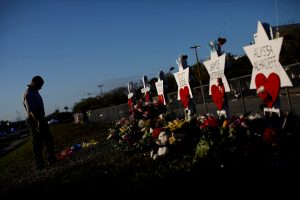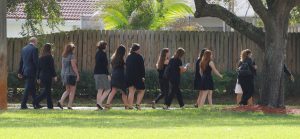
By Alexandra Ulmer
CARACAS (Reuters) – Yasmira Castano felt she had a fresh chance at life when she received a kidney transplant almost two decades ago. The young Venezuelan was able to finish high school and went on to work as a manicurist.
But late last year, Castano, now 40, was unable to find the drugs needed to keep her body from rejecting the organ, as Venezuela’s healthcare system slid deeper into crisis following years of economic turmoil.
On Christmas Eve, weak and frail, Castano was rushed to a crumbling state hospital in Venezuela’s teeming capital, Caracas. Her immune system had attacked the foreign organ and she lost her kidney shortly afterwards.
Now, Castano needs dialysis three times a week to filter her blood. But the hospital attached to Venezuela’s Central University, once one of South America’s top institutions, frequently suffers water outages and lacks materials for dialysis.
“I spend nights not sleeping, just worrying,” said Castano, who weighs around 77 pounds (35 kg), as she lay on an old bed in a bleak hospital room, its bare walls unadorned by a television or pictures.
Her roommate Lismar Castellanos, who just turned 21, put it more bluntly.
“Unfortunately, I could die,” said Castellanos, who lost her transplanted kidney last year and is struggling to get the dialysis she needs to keep her body functioning.
The women are among Venezuela’s roughly 3,500 transplant recipients. After years leading normal lives, they now live in fear as Venezuela’s economic collapse under President Nicolas Maduro has left the once-prosperous OPEC nation unable to purchase sufficient foreign medicine or produce enough of its own.
Some 31 Venezuelans have seen their bodies start to reject their transplanted organs in the last month due to lack of medicine, according to umbrella health group Codevida, a non-governmental organization.
At least seven have died due to complications stemming from organ failure in the last three months.
A further 16,000 Venezuelans, many hoping for an elusive transplant, are dependent on dialysis to clean their blood – but here too, resources and materials are sorely lacking.
Nearly half of the country’s dialysis units are out of service, according to opposition lawmaker and oncologist Jose Manuel Olivares, a leading voice on the health crisis who has toured dialysis centers to assess the scale of the problem.
In the last three weeks alone, seven people have died due to lack of dialysis, according to Codevida, which staged a protest to decry the critical drug shortages.
Once-controlled diseases like diphtheria and measles have returned, due partly to insufficient vaccines and antibiotics, while Venezuelans suffering chronic illnesses like cancer or diabetes often have to forgo treatment.
Hundreds of thousands of desperate Venezuelans, meanwhile, have fled the country over the past year, including many medical professionals.
Amid a lack of basics like catheters and crumbling hospital infrastructure, doctors who remain struggle to cope with ever scarcer resources.
“It’s incredibly stressful. We request supplies; they don’t arrive. We call again and they still don’t arrive. Then we realize it’s because there aren’t any,” said a kidney specialist at a public hospital, asking to remain anonymous because health workers are not allowed to speak publicly about the situation.
Venezuela’s Social Security Institute, tasked with providing patients with drugs for chronic conditions, did not respond to a request for comment.
“STRAIGHT TO THE CEMETERY”
Terrified transplant patients are indebting themselves to buy pricey medicine on the black market, begging relatives abroad to funnel drugs into the country or dangerously reducing their daily intake of pills to stretch out stock.
Larry Zambrano, a 45-year old father of two with a kidney transplant, resorted to taking immunosuppressants designed for animals last year.
Guillermo Habanero and his brother Emerson both underwent kidney transplants after suffering polycystic kidney disease. Emerson, a healthy 53-year-old former police officer, died in November after a month without immunosuppressants.
“If you lose your kidney, you go to dialysis but there are no materials. So you go straight to the cemetery,” said Habanero, 56, who runs a small computer repair shop in the poor hillside neighborhood of Catia.
A Reuters reporter went to the Health Ministry to request an interview, but was asked at the entrance to give her contact details instead. No one called or emailed.
Reuters was also unable to contact the Health Ministry unit in charge of transplants, Fundavene, for comment. Its website was unavailable. Multiple calls to different phone numbers went unanswered. An email bounced back and no one answered a message on the unit’s Facebook page.
Maduro’s government has said the real culprit is an alleged U.S.-led business elite seeking to sabotage its socialist agenda by hoarding medicine and imposing sanctions.
“I see the cynicism of the right-wing, worried about people who cannot get dialysis treatment, but it’s their fault: they’ve asked for sanctions and a blockade against Venezuela,” Socialist Party heavyweight Diosdado Cabello said in recent comments on his weekly television program.
Health activists blame what they see as Maduro’s inefficient and corrupt government for the medical crisis and contend that government announcements of more imports for dialysis are totally insufficient.
Despite his unpopularity, Maduro is expected to win a new six-year term in an April 22 presidential election. The opposition is likely to boycott the vote, which it has already denounced as rigged in favor of the government.
Maduro has refused to accept food and medicine donations, despite the deepening healthcare crisis. Health activists and doctors smuggle in medicines, often donated by the growing Venezuelan diaspora, in their suitcases, but it is far from enough.
In the decaying hospital and dialysis center visited by Reuters, patients clamored for humanitarian aid.
Dolled up for her birthday and surrounded by cakes, the 21-year-old Castellanos took selfies with her friends and spoke excitedly about one day returning to dance, one of her passions.
But fears for her future permeated the room. A hospital worker stopped by to wish Castellanos many more birthday celebrations but her worried face betrayed doubts.
“Other countries need to help us,” Castellanos said.
(Additional reporting by Liamar Ramos and Leon Wietfeld; Writing by Alexandra Ulmer; Editing by Brian Ellsworth, Daniel Flynn and Tom Brown)











